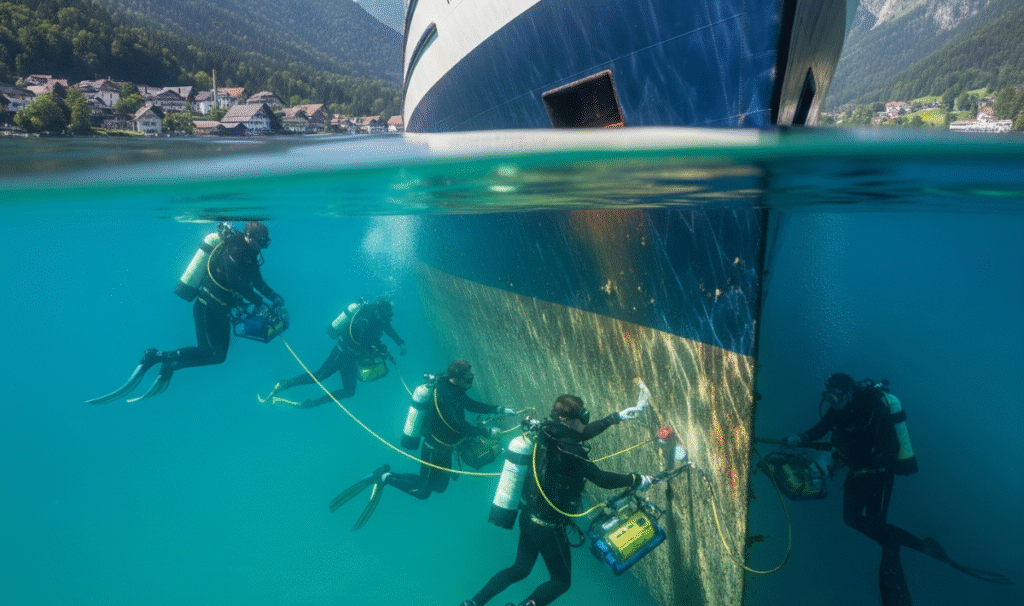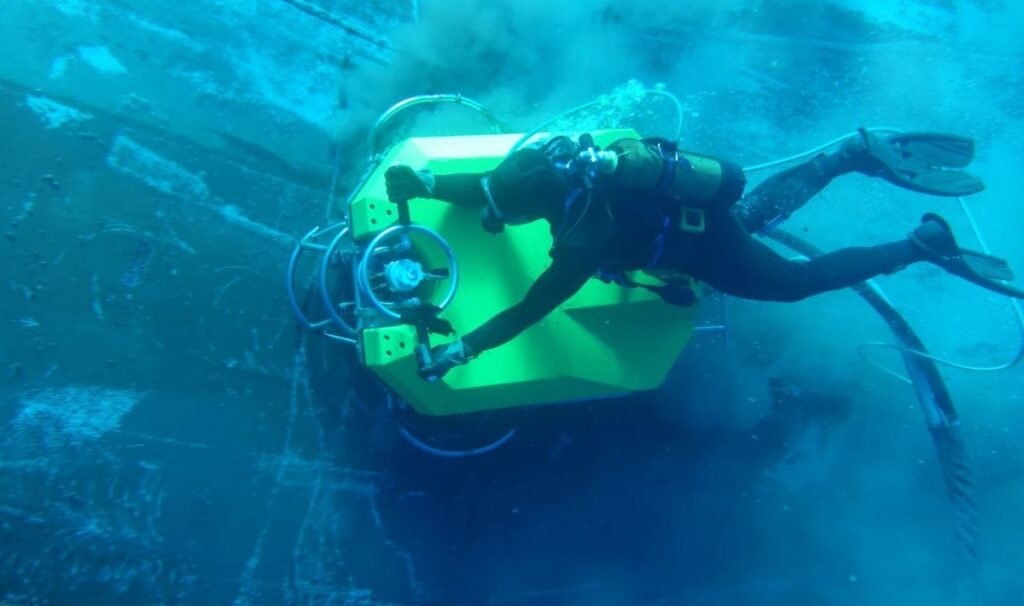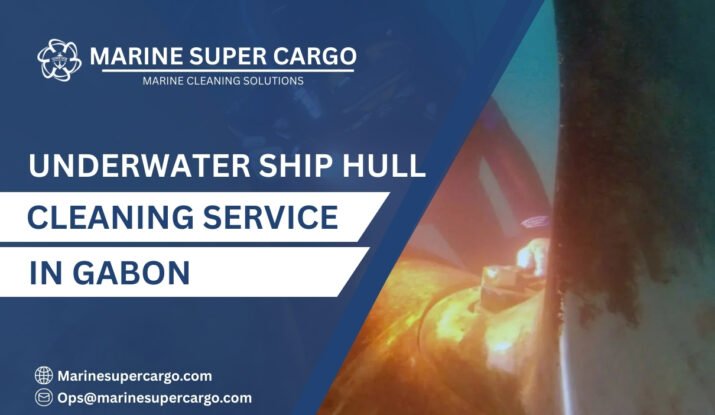Imagine the busy port of Port-Gentil, ships readying for their next voyage across the vast Atlantic. On the surface, it all looks calm and efficient. However, beneath the waterline lies a hidden battle—biofouling, the unwelcome buildup of marine growth, slowing ships down and increasing fuel consumption. Cleaning these underwater ship hulls is necessary, but not without risks. Let’s pull back the curtain and explore the underwater ship hull cleaning in Gabon—risks that every shipowner and operator must understand to protect people, profits, and the pristine Gabonese coastline.
Underwater ship hull cleaning in Gabon sounds straightforward: remove barnacles, algae, and slime to keep vessels smooth and swift. But beneath this simple premise hide risks so serious they can affect our marine environment, operational safety, and legal standing. The beautiful but sensitive coastal waters of Gabon make these risks even more pressing. Understanding these shocks isn’t just smart—it’s essential.
Why Underwater Ship Hull Cleaning in Gabon Is Vital Yet Risky
In Gabon’s busy ports, underwater ship hull cleaning is both a necessity and a challenge. Biofouling increases drag, reduces speed, and forces engines to burn up to 40% more fuel—raising costs and emissions. Cleaning below the waterline instead of drydocking saves time and operational expenses, but it comes with risks. Environmental contamination, coating damage, diver safety hazards, and potential regulatory penalties all loom large. That’s why many shipowners rely on expert providers like cleanship.co, who combine compliance, safety, and efficiency for reliable hull cleaning in Gabon’s waters.

Environmental Contamination in Gabonese Waters
Underwater ship hull cleaning in Gabon comes with a serious environmental challenge: contamination. Scrubbing a vessel’s surface often strips away antifouling coatings that contain biocides, heavy metals, and other toxic compounds. Once released, these pollutants seep into surrounding waters, endangering coral reefs, mangroves, and the delicate marine food chain. Equally concerning is the dispersal of biofouling debris, which can carry invasive species and threaten Gabon’s unique coastal biodiversity. With one of West Africa’s richest marine ecosystems at stake, improper cleaning practices risk long-term ecological damage, making responsible methods and strict compliance essential for sustainable shipping operations.
Spread of Invasive Species Threatening Local Biodiversity
Biofouling organisms may seem small, but their impact can be monumental. They travel stuck to hulls, and improper cleaning can release them to invade new waters, outcompeting native species and damaging fisheries vital to Gabon’s economy. The International Maritime Organization (IMO) and the MARPOL Convention strictly regulate such risks, but enforcement can be challenging, making awareness and caution critical to minimizing harm.
Physical Damage to Hull and Safety Concerns
Damage to Anti-fouling Coatings and Hull Integrity
Think of your vessel’s hull like the paint on a luxury car—careless cleaning can do more harm than good. In Gabon, where tropical waters speed up corrosion, improper underwater cleaning with abrasive tools or untrained divers can strip away expensive anti-fouling coatings. This leaves steel vulnerable to rust, accelerates structural wear, and drives up costly repairs. Protecting coatings is as critical as removing biofouling, making professional expertise essential. With global best practices supported by organizations like the International Association of Ports and Harbors (IAPH), shipowners can safeguard both efficiency and hull integrity.
Diver Risks and Operational Challenges
The ocean doesn’t pause for safety checks. Poor visibility, strong currents, and variable weather common off Gabon’s coast increase the dangers for divers performing cleaning operations. Fatigue, entanglement, and equipment failure have led to injuries or worse. The International Marine Contractors Association (IMCA) provides strict safety guidelines, but adhering to these in real-world Gabonese conditions requires experience and vigilance.
Potential Fines and Inspection Failures
French-speaking Gabonese authorities regularly inspect vessels in ports like Port-Gentil to ensure compliance. Discovering non-compliance during underwater cleaning—such as pollution, improper waste management, or unauthorized operations—could lead to hefty fines and detentions. Such regulatory risks highlight the importance of professional and compliant underwater hull cleaning services in Gabon.
How to Mitigate These Risks Effectively
Managing the risks of underwater ship hull cleaning in Gabon requires careful planning and professional execution. Always hire certified teams, preferably IMCA-trained, who apply eco-friendly methods with debris-recovery systems designed for local marine conditions. Transparent communication with authorities and thorough documentation of compliance reduce regulatory exposure. Smart scheduling during calm weather protects both divers and equipment from unnecessary hazards. Most importantly, build regular safety checks and environmental audits into every operation. By combining skilled personnel, proper timing, and strict oversight, shipowners can achieve efficient hull cleaning while minimizing risks to vessels, crews, and Gabon’s ecosystems.

What Makes Gabon a Unique Environment for Underwater Ship Hull Cleaning in Gabon?
Gabon’s Atlantic coastline is a vibrant marine biodiversity hotspot with tropical conditions accelerating biofouling growth. Its ports face logistics challenges, including frequent rough seas and the need to maintain ecological balance around sensitive mangroves and coral reefs. These unique factors make professional underwater hull cleaning not just necessary, but demanding and sensitive.
Conclusion:
Underwater ship hull cleaning in Gabon is undeniably essential to efficient and green maritime operations. Yet, underwater ship hull cleaning in Gabon — environmental contamination, physical damage & diver safety, and regulatory pitfalls—demand respect and proactive management. Embracing certified expertise, eco-conscious technology, and compliance turns these risks from liabilities into manageable factors. That way, your ship sails faster, cleaner, and safer, while Gabon’s precious marine environment flourishes.
FAQ:
Q1. How frequently should underwater ship hull cleaning in Gabon be done?
Twice a year is a common recommendation, but tropical growth may require more frequent cleaning, especially in busy ports like Port-Gentil.
Q2. Is underwater hull cleaning environmentally safe in Gabon?
When performed by certified teams using MARPOL-compliant equipment with debris recovery, the environmental impact is minimized.
Q3. What certifications should a cleaning service have?
Look for IMCA certification and adherence to IMO and MARPOL environmental and operational standards.
Q4. What risks do divers face during hull cleaning in Gabon?
Poor visibility, strong currents, and equipment failure are major diver risks, making safety training and protocols critical.
Q5. What penalties exist for non-compliance during underwater ship hull cleaning in Gabon?
Fines, vessel detentions, and reputational damage are common penalties enforced by Gabonese maritime authorities aligned with international regulations.


